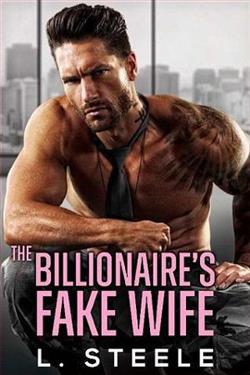Page 17 of Rhapsody of Ruin
Rhydor moved.
The clearing changed with him.
He did not run so much as erase the distance between himself and the thing that wore a stag’s mask. He hit it at the shoulder and all its wrong geometry went wronger. He was not armed; his sword still sat peace-wrapped at the portico in a gesture of respect he had made without flinching. He did not need steel. He needed his hands and the weight of his body and a sudden, bright, disciplined blaze that licked along his skin like an oath.
Glamour does not know what to do with men like that. It tries to account for them and cannot. He grabbed the not-stag by the not-antlers and wrenched, and when the image hiccuped, he drove the fracture open, fingers gouging into the spell-lines where it hid its seams. The creature flickered, thorned mouth, stag’s face, nothing, and then simply wasn’t. It collapsed with a pop of pressure that made every lantern flame jump.
Silence held for one stunned second. You could feel the court recalculating: the odds they had placed, the jokes they had sharpened, the stories they would tell.
Then the sound hit, the mixture of excited laughter and displeased hissing that passes for applause when the audience liked the gore and hated the ending. The nobles nearest me turned their masks in my direction to see if I would join them.
Rhydor crouched without ceremony and offered Tharos his uninjured hand. The iron gauntlet scraped once against his palm as he hauled the bigger man to his feet. The veterans closed around them in a knot, Brenn’s grin sharp as he said something I couldn’t hear, Draven clapping Tharos’s shoulder and whispering into his ear until the tight set of the man’s jaw eased.
I breathed again because they did.
Sir Thalen Morwyn stood near the hedge with his helm tucked against his side like a penitent’s hat. His mouth had fallen open a fraction. “Saints,” he said quietly to no one in particular, the word full of awe instead of prayer. “I’ve never seen glamour torn barehanded.”
“Perhaps you should have,” I said over my shoulder without turning. “It might have taught you to use less of it.”
He startled, then flushed a careful pink. “Princess, ”
“Save it,” I said. “Explain to me later why killing a guest is such a diverting concept in your manuals.”
“Your manuals,” he pointed out, rallying. “I’m sworn to your Queen.”
I kept my gaze on my brother and smiled with my teeth. “Then perhaps swear also to your conscience.”
His breath stuttered. I left him there.
I stepped into the open where every eye could find me. Rhydor looked up as if I had pulled a string from across the clearing. He straightened like a man bracing for a blow. For half a heartbeat the air between us held something like it had the night of the wedding, heat that was not anger, gravity that was not law. Then the court’s weight dropped back into place and I carried it alone.
“Iriel,” I called, using no title.
A hush slid over the grass. Even the silver dew seemed to still.
“My lady sister,” he said, sweet as a plum. “You look as if you disapprove.”
“I do.” I did not raise my voice; I placed it. “You set glamour to strike flesh. The steward wrote ‘stag’ on his slate and you gave him something else.”
“The stag was very convincing,” he said mildly. “Until your husband tore it in half.”
A murmur chased the word husband through the watching masks and circled back to me with teeth. I did not flinch. Names only cut if you gave them a place to rest.
Rhydor stood very still, a line of iron at the center of my sight.
“Call it what you like,” I said. “It was unfair.”
A laugh slid from three masks at once. Sylara’s fan moved like a wing. “Fair,” she breathed, tasting the word as if it were a pastry. “How… quaint.”
I did not look at her. “You don’t hunt to see what beasts can do,” I told my brother. “You hunt to see what men will stomach.”
Iriel’s eyes thinned behind the curve of his mask. I had not spoken so sharply in front of him since we were children, when he was all knees and ambition and I was still learning that my mother loved me best held at arm’s length. He let the smile return with effort enough that I saw it. “Careful, Elowyn,” he said, softly enough that only the front rings of listeners would hear. “You will make people think you care for them.”
That struck harder than I meant it to. It always did. I stepped toward him anyway. The lantern light made a long line out of my shadow and turned the dew at my hem to pearls.
“I would rather care for them,” I said, “than feed them to your games.”
He tilted his head, wolfish. “Is that what you think you did last night?”















